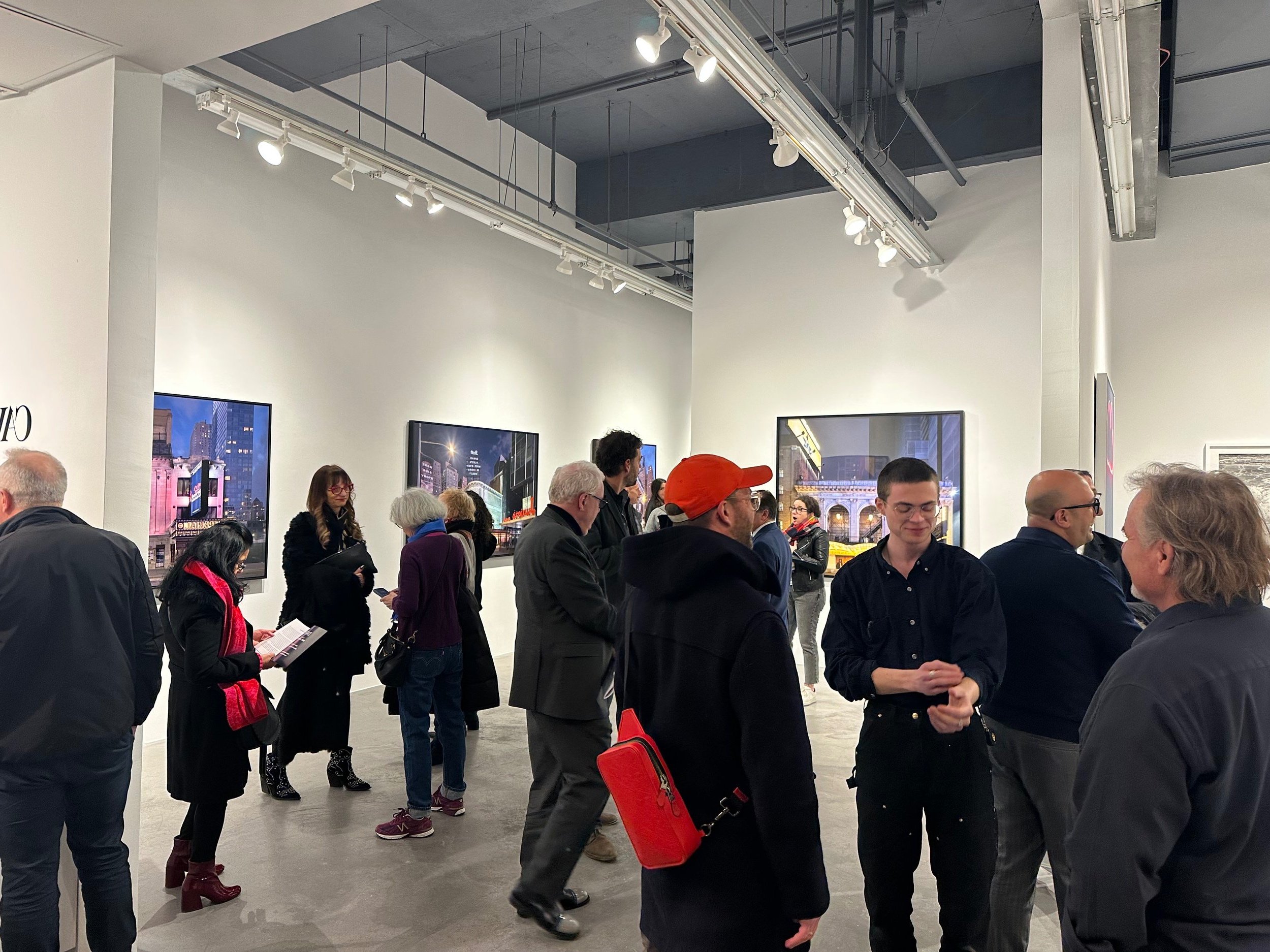Mark S. Kornbluth • Dark
Mark S. Kornbluth
Dark
Cavalier Gallery presents DARK
An exhibition of Broadway-inspired photographs by Mark S. Kornbluth
Cavalier Gallery presents DARK, an exhibition of Broadway-inspired photographs by Mark S. Kornbluth February 2, 2023, February 2, 2023, New York, NY —Cavalier Galleries is delighted to announce DARK—a solo exhibition of Mark S. Kornbluth’s photographs of Broadway theatres during the pandemic closure. The series comprises large-format photographs of dozens of New York City theater exteriors, a majority of which will be on display in the exhibition. Images of the Ambassador, Barrymore, Booth, Eugene O’Neill, Imperial, Lunt-Fontanne, Lyric, Music Box, New Victory, and Richard Rodgers theatres are featured, among others. Broadway shows captured in the historical moment include The Book of Mormon, Hamilton, Hangmen, Harry Potter and the Cursed Child, The Inheritance, Moulin Rouge, Who’s Afraid of Virginia Woolf?, and TINA: The Tina Turner Musical. The exhibition opens Thursday, March 2, with an artist reception from 6–8 p.m. and runs through Saturday, April 15, 2023. In 2020 when Broadway stages went dark, New York City’s theatre buildings lit up the quiet nights in a state of suspended animation. With a mentor's encouragement, Kornbluth traded his 35 mm for a large format digital camera and began taking pictures of as many theatres as possible.
Access to one of the busiest places on earth was unprecedented, and he took dozens of images of each structure from the deserted streets, returning night after night until certain he had captured all he needed. Kornbluth explains, “I started this series to dramatize the language and narrative in the signage, contrasted with the stillness of the mise-en-scène. Despite the sudden and lasting emptiness that the pandemic gave rise to, I discovered a delightful tension, a sense of Broadway waiting for the promise and renewal that art invariably brings. I’m deeply curious about relationships between objects, how emotions are rooted in time and place, and how to create the power of a shared experience.” Kornbluth will tell you that he has always had a camera with him, for as long as he can remember, but that photography is not his only artistic love, just the one which continues to magnetize him. As a teen, he secured an internship as a production assistant, converted that to an assistant stage manager role through ambition, a keen mind, and an infectious energy, and spent ten years in the theatrical arts—touring Broadway shows around the country and working in film and television. He subsequently earned an MFA in acting and has studied a range of disciplines including art history, literature, psychology, and art therapy. It is no surprise then that his dramatic talents, wandering intellect, and insatiable curiosity find a home in the work of a fine art photographer.
At once he is screenwriter, stage manager, director, and producer, an explorer of his world through the lens. Working his artistic magic in post-production, out of many, Kornbluth creates one final image that encapsulates the poetry of a scene, preserving in his craft the mood of suspended animation and the romance of memory. In his own words, he “sculpts” the photograph from individual frames, using additions and subtractions to produce a finished work of art. “I love the way that the ambient light at night, billboards and streetlights became my studio lights, illuminating the grandeur that has always been, and remains unique to New York City,” the artist says. There is no single figure in Kornbluth’s theatre images, yet they are deeply human. The series is a profound reminder of how acutely and uniquely one feels the presence of others in their absence. The relationship of the urban environment to the people who inhabit it, and the mutual impact of one on the other, is an idea that continues to compel the photographer’s work. Though Broadway has reopened, and the city streets teem with life once again, Kornbluth finds his inspiration in the silent spaces, the dead of night, and the interstitial moments, allowing us to see the unseen, encounter one another in unexpected ways, and consider our environments anew.
Artist Statement
“My life is deeply tied to New York City, Times Square and Broadway. It started here, and I always return to this place; I did theatre professionally, and many of my close friends still do.
I approached this series with the intention to dramatize the language and narrative in the signage, contrasted with the stillness of the mise-en-scene. Despite the sudden and lasting emptiness that the pandemic gave rise to, I discovered a delightful tension, a sense of Broadway waiting for the promise and renewal that art invariably brings. Returning night after night to the abandoned Theater District, I walked the streets, making my way past shuttered restaurants. I was enveloped by the hush that fell over the city, broken by the occasional siren. I was able to capture the individual images that became “Silent Broadway: a series of theatres, dark, during the pandemic.” I chose to work in medium format, which allowed me to document the unpopulated landscape in stark contrast to the nuanced details of the theaters.
Studying acting at the graduate level gave me a greater sense of proportion, relationships, and theatricality. I’m deeply curious about relationships between objects, how emotions are rooted in time and place, and how to create the power of a shared experience. This project is a culmination of everything I’ve done with my life, a return home.
I invite my audience to view these images as I have come to see them, as windows through which memory and time work in both directions —we need only look a little closer to know we will someday return, together.”


















































